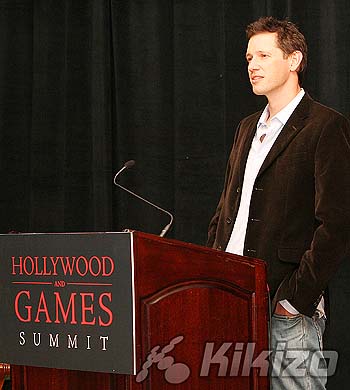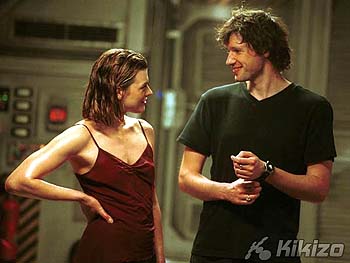Hollywood and Games Summit: Full Report
From the people behind Game Developers Conference, the Hollywood and Games Summit in Beverly Hills looked at the riddles of the game-movie relationship and provided interesting insights. Our man in the hills reports.
Yesterday at the incredibly plush Beverly Hills Hotel in L.A, a number of top bods in gaming and movies met up to try and crack the eternal riddles of making games and movies work hand in hand, and why games-to-film licensing tends to yield mixed results.

The conference opened with one Paul W.S. Anderson - director of such films as Mortal Kombat, Resident Evil, and next year's Castlevania - who took the time to compile a video history of licensed game-movies. The sad reality is that most of them are pretty lacklustre, with the best ones perhaps being Tomb Raider and a few of Anderson's earlier game flicks. Oh, and of course Street Fighter for shameful comedy reasons.
His talk was enlightening - it answered fanboy questions like "why isn't my favourite character in there?" or "why aren't films faithful to the games". He suggested that while it's important to respect the source material, to slavishly follow it would lead to bland and predictable results. Including all the characters from the game, or dressing the lead character exactly as they are in the game, is also a no-no, he said.
His practical example was using Resident Evil. Instead of casting roles for the full main cast list of the game, Anderson's company chose instead to cast the same character archetypes, to lend themselves greater creative freedom.
Other tricks of the trade he shared with the audience included: pick a game that was already influenced by films, to increase likelihood of getting a good film out of it. His examples were Tomb Raider chimping Raiders of the Lost Ark, Resi Evil being George Romero's Dawn of the Dead, Mortal Kombat being Enter The Dragon meets Jason and the Argonauts and DOA being Enter the Dragon with hot girls.
Setting the film as a prequel to the game, with the last shot of the film mimicking the first shot of the game, also lent them the freedom to focus on bringing the basics of the game to the film world, in an effective way.
While many criticise the film, what can't be ignored is the fact that most games stories have been written with an entirely different dramatic structure, that would be more fitting to translate to TV rather than a 90 minute feature. It should also be remembered that a lot of game stories suck. Street Fighter was one such example Anderson singled out as one which should not have been made into a film, mainly for weak story reasons, but the credibility of this statement was numbed when he mentioned "no-one is queuing up to make Street Fighter 3". Though he may have confused his brain in thinking the film was called Street Fighter 2.
Probably the lowlight of his talk was when he tried to talk about what made games good, giving off an air of, well, dishonesty. Or at best, trying too hard pander to the Hollywood's vague understanding of games. His explanation for what made Mortal Kombat a good game was forced at best, describing it as "containing superior mechanics to other games" and "giving players a kick-ass time". Although he 'understood' that Fatalities were a small part of the in-game experience, it's clear he missed the culture that whole thing started with people spending money to search for them and excitedly sharing techniques with other players.
Regardless, the talk overall contained lessons to learn from and he closed with his belief that the synergy, "the 'S' word", was an untapped market, with his current baby being a project that will be realised as a game, movie, graphic novel and TV show. He's been developing it for a few years now and divulged no further details, though he did say working in this way was cheaper from a production standpoint and allowed the ease of sharing assets across those media.
Later highlights of the conference included a talk about how to pitch to a game studio and a TV studio, with VPs Steve Asbell and Neil Young from Fox and EA respectively, joined by Keith Boewsky, whose agency which represents game and movie projects and talents.
Neil Young - using lovely slides on his Macbook Pro - talked about how simple ideas and talented, proven developers are key, whereas Steve Asbell said that there is no magic formula.One of his favourite concepts being pitched was a film starring Eddie Murphy as a spaceship carrying very tiny people in his body. They land on Earth to evaluate it for resource farming and he falls in love, and it's part comedy part submarine film.
Meanwhile, Keith Boewsky kept things light-hearted and shared a list of key differences about games and movies:
- 69% of adults play games
- 65% of adults have seen one movie in the last year
- Average age of gamers: 33
- Average age of film audience: 24
- Average player invests 228 hours per year playing games
- Average movie buff watches films for 19.8 hours per
Fascinating stuff. Other talks, meanwhile, included one about online content delivery featuring folks from Sony Pictures and Microsoft Xbox Live Marketplace, another with Dave Perry on the differences between the two businesses.
A session called 'The Cross Pollination of Creative Techniques', featuring notables Flint Dille who wrote Transformers The Movie and Steve Gray, EA's Exec Producer of Lord of the Rings was also thrown in for good measure. Though luckily for Flint, no-one asked him why he killed Optimus Prime.
Overall, an interesting event with new things learned about the business - and it was good to rub shoulders with top names in the field.
Daniel Boutros
Contributor, Kikizo Games









 Satoru Iwata Video Interview - the late Nintendo president spoke with Kikizo in 2004 as 'Nintendo Revolution' loomed.
Satoru Iwata Video Interview - the late Nintendo president spoke with Kikizo in 2004 as 'Nintendo Revolution' loomed. Kaz Hirai Video Interview - the first of Kikizo's interviews with the man who went on to become global head of Sony.
Kaz Hirai Video Interview - the first of Kikizo's interviews with the man who went on to become global head of Sony. Ed Fries Video Interview - one of Xbox's founders discusses an epic journey from Excel to Xbox.
Ed Fries Video Interview - one of Xbox's founders discusses an epic journey from Excel to Xbox. Yu Suzuki, the Kikizo Interview - we spend time with one of gaming's most revered creators.
Yu Suzuki, the Kikizo Interview - we spend time with one of gaming's most revered creators. Tetris - The Making of an Icon: Alexey Pajitnov and Henk Rogers reveal the fascinating story behind Tetris
Tetris - The Making of an Icon: Alexey Pajitnov and Henk Rogers reveal the fascinating story behind Tetris Rare founders, Chris and Tim Stamper - their only interview? Genuinely 'rare' sit down with founders of the legendary studio.
Rare founders, Chris and Tim Stamper - their only interview? Genuinely 'rare' sit down with founders of the legendary studio. The History of First-Person Shooters - a retrospective, from Maze War to Modern Warfare
The History of First-Person Shooters - a retrospective, from Maze War to Modern Warfare